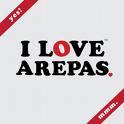After being in Melbourne for just a week my body was already missing it’s typical Venezuelan breakfast: an arepas filled with cheese. I wondered how long it would be before I could eat arepas again. This question was quickly answered by my Venezuelan friends who told me where I could buy my dear Harina Pan – the special maize flour used to make this Venezuelan dish.
I am not trying to promote a particular brand here but the only flour that works is Harina Pan – if you buy any other type of corn flour the texture is not quite right and the whole dish comes out completely wrong. I can say this with some authority – my friend Jarrah (who helps me write this column in English) has spent many hours and a lot of money trying to find a substitute for Harina Pan and herarepas have a strange taste…
It is amazing that when a person leaves their country the tastes and smells of the typical food they used to eat back home stay in their memory for years. One only has to look at a person who has immigrated to Australia and not returned to their country for a long time who drools like Pavlov’s dog with the sweet memory of food from their hometown. I have spoken with immigrants who came to this country more than 30 years ago when Melbournians were not as accustomed to drinking coffee as they are today.
One man told me he had to import his own coffee from his home country as he was so attached to it and the feelings and sensations it evoked for him when he drank it. Over the years the city has developed a strong food culture and now you can find almost any flavour you crave. It is clear how important it is for people, when they move here, to bring their preferred foods with them as much as they can in order to create a real home here.
As soon as I found out that I could buy Harina Pan to make arepas it only took me a total of three hours to find where it was sold, buy some, return home and prepare and cook them! At this point you are no doubt curious about what an arepa actually is. It is very simple: the arepa is a flat unleavened patty made of cornmeal which can be grilled, baked or fried. The “typical” arepa varies from region to region in Venezuela; along the coast they are flat and big, however in the plains they are thick and not as big. There are two ways to prepare the dough.
The traditional way, which is still used in the small towns in Venezuela, consists of a labour-intensive process in which a mortar, called a pilón, is used to pound maize into flour. The second, and more common method, is to buy pre-cooked arepa cornmeal and then mix it with water and salt, and occasionally oil, butter, eggs, and/or milk. After being kneaded and formed into patties, the dough is fried, grilled, or baked.
Arepas are sold everywhere in Venezuela, none of the vendors need legal permission, it is what we call the “Mercado informal”: these businesses are completely independent and free from invoicing and taxes. “Informal” vendors first prepare the arepas, and then place them in a container and cover it with aluminium foil to keep them warm. Traffic congestion in Venezuela is terrible, and arepas vendors take advantage of this and do good business selling breakfast to drivers.
In Caracas, for example, peak hour begins at 6am and people spend literally hours stuck at traffic lights. During this period of the day intelligent vendors appear at car windows offering delicious arepas filled with cheese, fish, meat, chicken or sausage as well as papelón con limon, a local beverage made with sugar cane and lemon.
If food sellers tried to do business in the same way in Melbourne they would be hit with a number of fines; one for selling without a business permit, another for not adhering to food hygiene standards, a third for disturbing the peace and finally customers would be fined for supporting illegal activity! So what then is “public” in Australia? Maybe this is one of the biggest differences between Australia and Venezuela, Venezuelans tend to accept chaos as part of their lives, it is both the source of joy and of happiness.
Australians on the other hand seem to reject chaos in favour of law and order which ensures calm and order but at the same time can be restrictive…
However, let’s leave behind these observations about chaos and order as they could not doubt create a controversial debate. The most important thing, to me, is that arepas have arrived in Melbourne and they are here to stay. Whether you find them at Victoria Market, Latin American cafés or try to make them yourself, don’t take them for granted – they are a delicious experience, they taste like home, and they should not be missed.
Editing and translation by Jarrah Strunin





